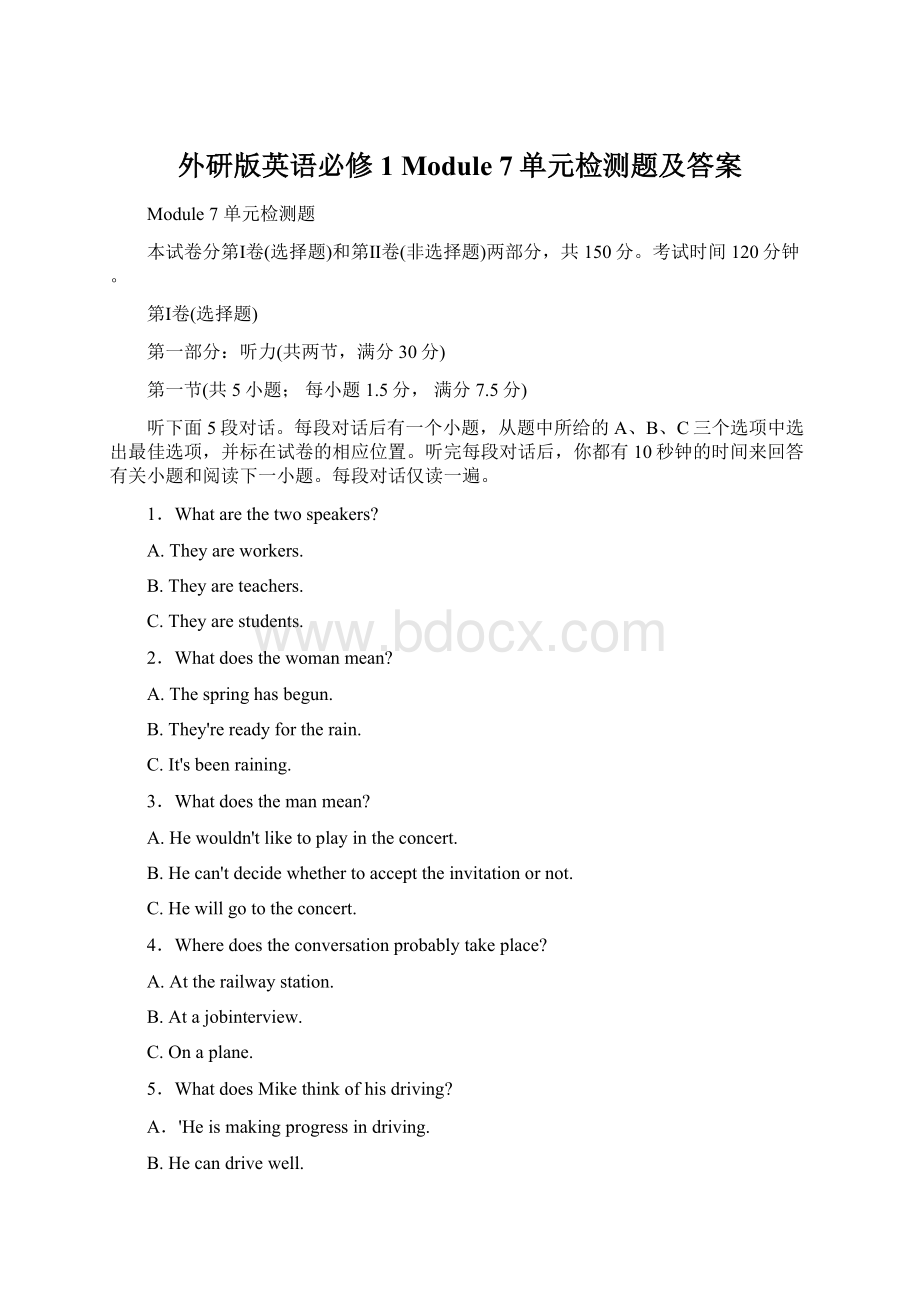外研版英语必修1 Module 7单元检测题及答案.docx
《外研版英语必修1 Module 7单元检测题及答案.docx》由会员分享,可在线阅读,更多相关《外研版英语必修1 Module 7单元检测题及答案.docx(19页珍藏版)》请在冰豆网上搜索。

外研版英语必修1Module7单元检测题及答案
Module7单元检测题
本试卷分第Ⅰ卷(选择题)和第Ⅱ卷(非选择题)两部分,共150分。
考试时间120分钟。
第Ⅰ卷(选择题)
第一部分:
听力(共两节,满分30分)
第一节(共5小题;每小题1.5分,满分7.5分)
听下面5段对话。
每段对话后有一个小题,从题中所给的A、B、C三个选项中选出最佳选项,并标在试卷的相应位置。
听完每段对话后,你都有10秒钟的时间来回答有关小题和阅读下一小题。
每段对话仅读一遍。
1.Whatarethetwospeakers?
A.Theyareworkers.
B.Theyareteachers.
C.Theyarestudents.
2.Whatdoesthewomanmean?
A.Thespringhasbegun.
B.They'rereadyfortherain.
C.It'sbeenraining.
3.Whatdoesthemanmean?
A.Hewouldn'tliketoplayintheconcert.
B.Hecan'tdecidewhethertoaccepttheinvitationornot.
C.Hewillgototheconcert.
4.Wheredoestheconversationprobablytakeplace?
A.Attherailwaystation.
B.Atajobinterview.
C.Onaplane.
5.WhatdoesMikethinkofhisdriving?
A.'Heismakingprogressindriving.
B.Hecandrivewell.
C.Thedrivingclassissoslowthathedon'tliketolearn.
第二节(共15小题;每题1.5分,满分22.5分)
听下面5段对话或独白。
每段对话或独白后有几个小题,从题中所给的A,B,C三个选项中选出最佳选项,并标在试卷的相应位置。
听每段对话或独白前,你将有时间阅读各个小题,每小题5秒钟;听完后,每小题将给出5秒钟的作答时间。
每段对话或独白读两遍。
听第6段材料,回答第6至7题。
6.WhatcanwelearnaboutMaryfromtheconversation?
A.She'llgotothepartyafter4:
00p.m.
B.Sherefusedtheman.
C.She'llbeabsent.
7.Wherewillthepartybeheld?
A.AtMary'shouse.
B.Attheman'shouse.
C.Atschool.
听第7段材料,回答第8至9题。
8.What'stheprobablerelationshipbetweenthetwospeakers?
A.Teacherandstudent.
B.Fatheranddaughter.
C.Fatherandson.
9.Whatcanweknowaccordingtothegirl?
A.Insummer,daysareshorter.
B.Whenitiscold,daysareshorter.
C.Heatmakesthingssmaller.
听第8段材料,回答第10至12题。
10.Whatisthemannow?
A.Ateacher.
B.Adancer.
C.Neither.
11.Whatisthewomangoingtodo?
A.Tolearndancing.
B.Torunadanceschoolonceshehasmovedtothetop.
C.Tofindanewjob.
12.Howisthewomangettingonwithherwork?
A.Shehasn'treachedthetopyet.
B.Sheisn'tverysuccessful.
C.Shedoesn'tlikeherpresentposition.
听第9段材料,回答第13至16题。
13.Whydoesthewomanlookfamiliartotheman?
A.BecausehemetherduringJunethisyear.
B.Becausehemetherlastyear.
C.BecausehemetherduringMaythisyear.
14.Whereisthewoman'ssisterprobablystudyingnow?
A.AtColumbiaUniversity.
B.AtWashington.
C.AtChicago.
15.ForwhatreasondidthewomangotoNewYork?
A.Toseehersisterandhaveasalesmeeting.
B.Tomeettheman.
C.Tovisitthecity.
16.Howisthewomangettingonwithherbusiness?
A.Justsoso.
B.Verybad.
C.Verywell.
听第10段材料,回答第17至20题。
17.HowoldwasBetty?
A.Shewassixyearsold.
B.Shewasfiveyearsold.
C.Shewassevenyearsold.
18.WhatdidBettythinkofhisfather'sname?
A.Abadname.
B.Alovelyname.
C.Anicename.
19.Howoldwastheteacher?
A.Aboutfifty.
B.Beyondfifty.
C.Itdidn'tmention.
20.WhatcanwelearnaboutBetty?
A.Shewasalovelygirl.
B.Shewasanaughtygirl.
C.Shecan'tcountthenumbers.
答案:
1-5CCBBA 6-10ABABC 11-15BABAA16-20CACCA
听力原文
Text1
M:
I'mgoingtovisittheChangjiangThreeGorgesthissummervacation.Howaboutyou?
W:
I'mafraidIcan'tgoanywhere.I'llhavetomakeupmylessons.
Text2
M:
Ithinkit'sgoingtorain.
W:
Startingtorain?
Thegroundisalreadywet.
Text3
W:
Hello.IsthatMike?
It'sBobhere.I'dlikeyoutoplayintheconcertforme.
M:
I'dliketo,butI'llseeifIhaveanytime.I'llringbackthisafternoon.
Text4
M:
Goodmorning!
CanIhelpyou?
W:
I'vecometolookforasuitablejob.
M:
Whatkindofjobhaveyoudonebefore?
W:
I'veworkedasadepartmentstoreassistantandasecretarybefore.
Text5
W:
Mike,howisyourdrivingclass?
Youarelearningtodrivewell,aren'tyou?
M:
Slowlybutsurely.
Text6
M:
We'rehavingapartyatourhousetomorrow,Mary.Itbeginsat4p.m.,willyoucome?
W:
Thankyouverymuch.Ishouldliketocomebutwehaveschoolintheafternoon,mustIcomeat4p.m.?
M:
Oh,youneedn'tcomeatfour,butIhopeyounottobetoolate.
Text7
M:
Now,whocantellmeanythingaboutheat?
W:
Heatmakesthingslarger,sir,andcoldmakesthingssmaller.
M:
Allright!
Givemeanexample.
W:
Insummer,daysarelongerbecauseitishot;inwinter,theyareshorterbecauseitiscold.
Text8
W:
Hi,David.Haven'tseenyouforages.Howareyougettingalongwithyourwork?
M:
Hi,Susan.Notsowellastobeexpected.I'veleftmyposition.Ican'tbeartherudenessofmybossanylonger.
W:
Whatareyougoingtodothen?
M:
Noidea.Anyway,I'vegottothinkaboutitseriously.Andyou?
W:
I'vebeenverysuccessfulasadancer.Ilikethiskindoflife.Itissoexciting.
M:
Youcan'tdothatforever.
W:
No.ButI'vedecidedtoopenadanceschoolonceI'vemovedtothetop.Alotofyoungdancersneedbettertraining.
M:
That'sawonderfulidea.
Text9
M:
Haven'twemetbefore?
W:
Idon'tthinkso.
M:
I'msurewehave.Youlooksofamiliar.WereyouatColumbiaUniversityduringMayorJuneoflastyear?
W:
Yes...Iwenttheretoseemysister,Susan.IhappenedtohaveasalesmeetinginNewYorkduringthatperiod.
M:
That'sright,I'mSusan'sfriend.Imetyouatyoursister'slastyear.
W:
Oh,I'msorry.What'syournameagain?
M:
I'mMikeRobinson.
W:
I'mEllenHarris.Sonicetomeetyou!
M:
Me,too.AndwhyareyouhereinChicago?
W:
Ihaveanothersalesmeetinghere.
M:
Oh,that'swonderful.Howisyourbusiness?
W:
Prettygood.Mybossisextremelysatisfiedwithmyjob,butI'mstilltryingtodobetter.
M:
Youarereallycapable.
Text10
ItwaslittleBetty'sfirstdayatschool.Theteachersaidtoher,“Comehere,littlegirl,andtellmeyourname.”
“MynameisBettyBrown,”answeredthelittlegirl.
“Andwhat'syourfather'sname?
”
“Oh,myfatherhasaverynicename,madam,hisnameisWilliamBrown.”
“Andhowoldareyou?
”wasthenextquestion.
“Iwassixlastbirthday.”
“AndhowolddoyouthinkIam?
”askedtheteacher.
“Please,madam.Idon'tknow.”saidBetty.“Icanonlycountuptofifty.”
第二部分 阅读理解(共两节,满分40分)
第一节(共15小题;每小题2分,满分30分)
阅读下列短文,从每题所给的四个选项(A、B、C和D)中,选出最佳选项,并在答题卡上将该项涂黑。
A
Peoplealwayssay,“Parents_are_the_best_teachers_of_their_children,”buttherealityisthatmanychildrenhaveoutdistancedtheirparentsinaspectssuchasusingInternettoobtaininformation.
Itissaidthata“post-figurative”phenomenonoccursinChinesefamilies,namelythatchildrenhavebeguntoinfluencetheirparentsinfieldssuchasinformationtechnology(IT),culturalconsumptionandentertainment.Childrenareactuallyteachingtheirparentsincertainaspects.
Lastweek,theChinaYouthDaily'sSocialInvestigationCentersurveyed1,750peopleviatheInternet,ofwhom,nearly39percentarethe1970sgeneration,andnearly40percentarethe1980sgeneration.Over56percentofrespondentsthinkthatthe“post-figurative”phenomenoniscommonandonlyslightlymorethan25percentregarditasrare.
Asforreasonsforthisphenomenon,nearly78percentofrespondentsattributeittothefactthatyoungpeoplearebetteratlearningnewthings,nearly67percentthinkthatyoungpeoplecanlearnnewskillsmoreeasilyandnearly39percentbelievethatitisdifficultforparentstoteachtheirchildrencertainaspectsbecauseofcertainrestrictionssuchaslowparentaleducationlevel.
Thesurveyshowsthatnearly42percentregardthe“post-figurative”phenomenonasgood,morethan35percentregarditasneithergoodnorbadandonlyabout8percentconsiderittobebad.
ZhouYunqing,vicepresidentoftheHubeiFamilyEducationResearchAssociationandaprofessorofsociologyatWuhanUniversity,saidthatchildrenhavebegunteachingtheirparents,whichhaschangedthetraditionalmodeofone-wayeducation.
Familyeducationshouldbeinteractive,hesaid.Childrenandparentsshouldlearnfromeachotherandpursuecommonprogress.Sincethemostsuitableeducationisthebesteducation,familyeducationshouldmeetthegrowthneedsofchildren.
文意大意:
随着互联网技术的发展,父母和子女需要相互的学习,共同进步。
21.Theauthorcitedtheunderlinedsentenceinorderto______.
A.provehisviewpoint
B.addfuntohiscomposition
C.showthethemeofthepassage
D.showthedifferencesbetweentraditionandreality
答案:
D 文章结构题。
从其后“but”一词可以知道作者是用来表示数字时代前后的巨大差异。
22.“Post-figurative”phenomenonrefersto________.
A.childrenteachingtheirparents
B.thesituationsaftertheinventionofcomputers
C.childreninfluencetheirparentsinfieldsofIT,etc
D.informationtechnology,culturalconsumptionandentertainment
答案:
C 词义猜测题。
其后有“namelythat...”表示解释。
23.ZhouYunqingthinksthat________.
A.familyeducationshouldbetwo-waymode
B.parentsarethebestteachersoftheirchildren
C.childrenshouldteachtheirparentssincetheyknowlittle
D.childrenshouldpursueprogresswhileparentsshouldwork
答案:
A 意图态度题。
从“whichhaschangedthetraditionalmodeofone-wayeducation.”可知传统的单向教育要向电子时代的双向教育转变。
24.Themostsuitabletitleforthepassagemaybe________.
A.Inrolereversal,Chinesekidsteachparents
B.Parentsarethebestteachersoftheirchildren
C.Childrenarethebestteachersoftheirparent
D.Post-figurativephenomenonoccursinChinesefamilies
答案:
A 主旨要义题。
孩子教父母是互联网时代的一个转变,选A比选项C准确。
B
NickPetrelsisadoctorinMontreal.Heworks60hoursaweek.Hetakescareof159patientsaweekinthehospitalandathisoffice.He'sbeenadoctorfortenyears.
Dr.Petrelsgiveshispatientsgoodmedicaladvice.Buthedoesn'tjusttellhispatientswhattodo.Healsosingstothemontelevision!
Dr.PetrelshashisownTVshow.TheshowisinItalian,EnglishandFrench.Thedoctorstartstheshowwithasongandthengivesmedicaladvice.Heexplainsamedicalproblemordiseaseinsimplelanguage.Afterthat,hesingsanothersong.
Dr.Petrelsproducesandperformsinhisownshoweveryweek.Theprogramisverypopularwithhispatientsandwithpeo